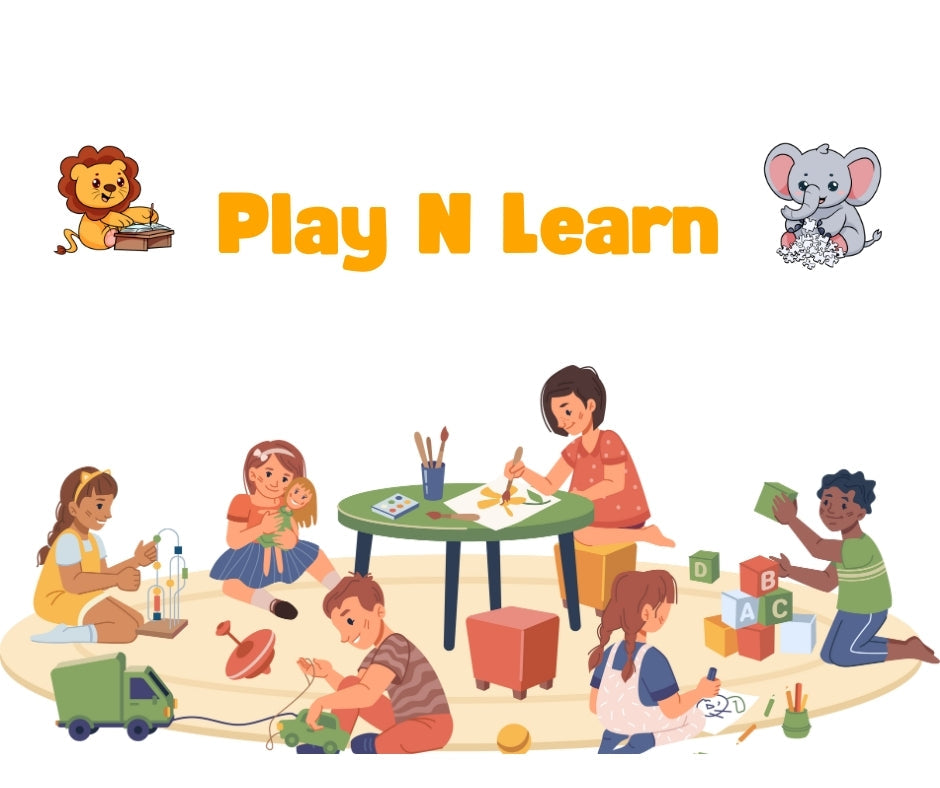
"Stop Teaching", Start Playing
Now, before you picture classrooms dissolving into unguided chaos, let me be clear: this isn't about abandoning education, but revolutionizing it through the incredible power of play.
Ever watched a child completely absorbed in building a magnificent Lego tower, meticulously arranging a tea party for their stuffed animals, or concocting a "magic potion" from mud and leaves? It looks like pure, unadulterated fun, right? And it is! But what if I told you that in those moments of joyful play, something incredibly profound is happening? They're not just playing; they're learning.
Welcome to the wonderful world of play-based learning – an approach that's revolutionizing how we think about early childhood education.

So, What Exactly IS Play-Based Learning?
At its heart, play-based learning is a pedagogical approach where children learn and develop skills through play. It’s child-led and child-initiated, but often gently guided or supported by observant adults. Instead of sitting passively at desks, children are active participants, exploring, experimenting, and making sense of the world around them through activities they naturally enjoy.
Think about it:
-
Building blocks become lessons in physics, engineering, and spatial awareness.
-
Dress-up and pretend play teach empathy, social roles, and complex storytelling.
-
Sensory bins (with sand, water, rice) explore textures, measurement, and scientific concepts.
-
Outdoor exploration fosters curiosity, gross motor skills, and an appreciation for nature.
This isn't about letting kids run wild without purpose. It's about creating a rich, stimulating environment where learning opportunities are embedded within enjoyable activities.
The "Traditional" Approach: A Quick Contrast
Many of us grew up with a more "traditional" model of learning: think worksheets, rote memorization, teacher-led instruction, and a focus on specific academic outcomes. While this method has its place, especially for older learners, it can sometimes miss the mark for young children by:
-
Focusing on a narrow set of academic skills.
-
Potentially stifling creativity and intrinsic motivation.
-
Overlooking the crucial development of social-emotional skills.
-
Making learning feel like a chore rather than an exciting discovery.
Why Play-Based Learning Wins: The Incredible Benefits
When children learn through play, they're not just acquiring knowledge; they're building a foundation for lifelong learning and well-being. Here’s how:
-
Develops Social & Emotional Superpowers:
-
Play: Negotiating roles in a game, sharing toys, taking turns during a board game.
-
Benefit: Children learn cooperation, empathy, conflict resolution, self-regulation, and how to understand and manage their emotions. These are vital life skills!
-
-
Boosts Cognitive Skills & Problem-Solving:
-
Play: Figuring out how to make a block tower stable, solving a puzzle, or creating a new game.
-
Benefit: Play encourages critical thinking, curiosity, memory, concentration, and the ability to tackle challenges creatively. They learn how to think, not just what to think.
-
-
Enhances Language & Communication:
-
Play: Describing their creations, narrating stories during pretend play, asking questions.
-
Benefit: Children expand their vocabulary, practice sentence structure, and learn the art of conversation and expressing their ideas effectively.
-
-
Fosters Creativity & Imagination:
-
Play: A cardboard box becomes a spaceship, a stick becomes a magic wand.
-
Benefit: Play is the ultimate incubator for imagination. It allows children to explore different possibilities, invent new worlds, and express themselves uniquely.
-
-
Builds Physical Prowess:
-
Play: Running, jumping, climbing (gross motor skills); drawing, cutting, manipulating small objects (fine motor skills).
-
Benefit: Play naturally helps children develop coordination, balance, and strength, which are crucial for everything from writing to sports.
-
-
Cultivates a Love for Learning:
-
Play: Learning feels joyful, engaging, and intrinsically rewarding.
-
Benefit: When learning is fun, children are more motivated to explore, ask questions, and seek out new knowledge. This creates positive associations with learning that can last a lifetime.
-
It's Not "Just" Play, It's Purposeful Play
One common misconception is that play-based learning is unstructured chaos. In reality, effective play-based environments are thoughtfully designed. Educators and parents act as facilitators, observing children, asking open-ended questions to extend their thinking, providing appropriate resources, and gently guiding when needed. The learning is intentional, even if it looks like effortless fun to the child.
Embrace the Power of Play!
So, the next time you see children deep in play, remember the incredible learning journey they're on. Play-based learning isn't a step back from academics; it's a powerful, holistic approach that builds a stronger, more resilient, and more curious foundation for all future learning.
Let's encourage our children to play more, explore more, and imagine more. After all, the work of childhood is play!
What are your favorite play-based activities? Share your thoughts and experiences in the comments below!

